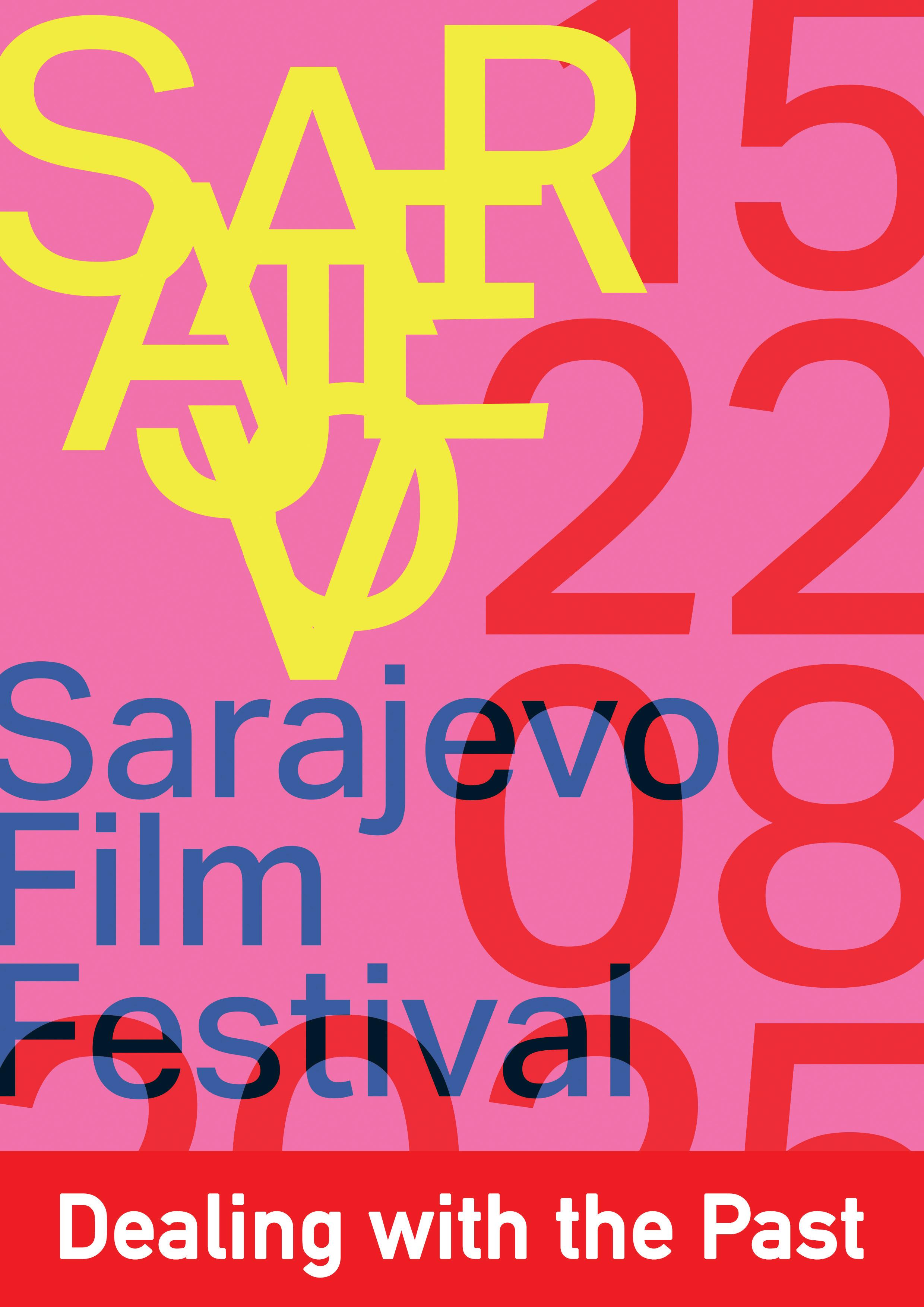
Supported by:
Programme Partners:



Main Sponsors of Sarajevo Film Festival:


Supported by:
Programme Partners:



Main Sponsors of Sarajevo Film Festival:
As it does every year, the Dealing with the Past programme provides an opportunity to map contemporary global conflicts and crisis through the prisms of personal stories, historic intersections, and cultural contradictions. More importantly, it creates a space to explore ways in which trauma and collective remembrance turn into creative impulse and in which filmmakers refuse, through their art, to accept either dogma or dominant ideological and political narratives.
The programme opens with the world premiere of THE FINAL BATTLE, the directorial debut of the highly respected conceptual artist Mladen Miljanović. The film is structured around an audition for an imaginary blockbuster in which former soldiers, civilian victims of war, and young people not directly touched by war take part. By exploring the ways in which war is simulated, aestheticised, and normalised in contemporary culture, THE FINAL BATTLE functions at once as social experiment, artistic act, and political reflection.
NORTH SOUTH MAN WOMAN, co-directed by filmmakers Morten Traavik and Sun Kim focuses on an unusual Seoul-based matchmaking agency that specialises in bringing together potential partners from North and South Korea; through clients’ encounters, the filmmakers reveal nuanced intimacy and the yearnings and disappointments that accompany love relationships and marriages in these divided nations. (Of particular note, in his many years of living and working in South Korea, Traavik organised, among various other things, a culturally subversive act of the highest order: a Laibach concert in Pyongyang.)
While most of the films in the selection focus on the victims of conflict and its uncontrollable im-
pact on everyday life, Tommy Gulliksen’s FACING WAR offers a different perspective: direct insight into the top echelons of NATO during a turbulent time. The film follows the final year of Jens Stoltenberg’s mandate as Secretary General of the organisation, offering a rare unfiltered perspective of power in action. FACING WAR is not an apology for political influence but rather a document about its limits and the challenges world leaders face daily.
We commemorate the thirtieth anniversary of the Srebrenica genocide with a film that offers a new view on the tragedy. Chiara Sambuchi’s THE SREBRENICA TAPE—FROM DAD, FOR ALISA tells the story of a young woman who, guided by a VHS tape recorded by her father in besieged Srebrenica, goes on an emotional journey to discover the truth about her family history. Blurry images become the starting point for a reconstruction of life and death, loss and remembrance, a personal pursuit and collective trauma of the July 1995 genocide.
Two exceptional films focus on the tragedy of the Israeli-Palestinian conflict. PUT YOUR SOUL ON YOUR HAND AND WALK, surely the most moving documentary produced this year, is composed of more than two hundred days of video calls between the director, Sepideh Farsi, and Fatima Hassouna, a young photographer from northern Gaza. Through pixellated video calls full of fear, courage, and creativity, a portrait emerges of a girl whose spirit defies daily losses—and, it seems, even her own death. Testimonies of Pain and Hope, another world premiere, is a series of six short vignettes directed by Ayelet Bargur, Executive Director of the Parents Circle–Families Forum organisation. Through intimate testimonies of Palestinians and Israelis who have lost loved ones shows how in-
dividual loss can be transformed into a collective call for reconciliation and the tearing down of barriers built by hate.
JUNE TURMOIL, made by Želimir Žilnik in 1969, documents the 1968 student demonstrations in Belgrade, the most vocal criticism of the “red bourgeoisie” at the time. It is an essential artifact of New Yugoslav Film and a classic of 1960s European political cinema.
Christina Bartson’s ALSO RESISTERS takes us back to that same period in the United States to look at the resistance to US militarism in Vietnam and the repression that occurred Stateside. Inspired by a 1968 essay by US activist and pacifist David E. McReynolds, the film focuses on solidarity and resistance across generations.
Another world premiere, LEFT BEHIND by Yannis Karpouzis, is an experimental film that takes the form of a young activist’s video diary in which the intimate and collective, personal and political intertwine during the demonstrations that dominated Greek politics in the early 2020s.
Aleksandar Reljić’s THE LOUDEST SILENCE follows the student demonstrations that have dominated political life in Serbia since November 2024. On New Year’s Eve that year, students in Novi Sad and citizens across Serbia stood in silence to commemorate their compatriots who were killed when a canopy at the Novi Sad Railway Station collapsed. Through portraits of young activists, Reljić captures the moment when silence becomes the loudest form of resistance.
The second-to-last day of the programme is dedicated to considerations of World War II. AMBAS-
SADOR OF REMEMBRANCE, by Magdalena Zelasko, tells the moving story of Stanisław Zalewski, a witness to Nazi concentration camps. Via his personal testimony, the film brings fragments of the past to life and stresses the importance of active, cross-generational remembrance in transcending formal commemoration rituals.
The only feature-length narrative film in the selection this year, Christoph Baumann’s THE DESERTER, proves that the classic film genre of melodrama has the power to create space for emphatic identification. Through the story of an “impossible couple”—a woman and a man turned against each other by history—Baumman researches the possibility of charting new paths for the future. This year’s edition of Dealing with the Past closes with a true modern classic: Igor Bezinović’s Fiume o morte!, the winning film of the 2025 International Film Festival Rotterdam, which explores how a bizarre episode in the history of Rijeka is (not) remembered through generations. The film closes with scenes from the Rijeka Carnival— sights of collective happiness, cheer, and love. FIUME O MORTE! is also Bezinović’s passionate love letter to his hometown.
It is not by chance that we chose such happy scenes as the grand finale of this 2025 edition of the programme—dealing with the past need not manifest exclusively as pain, sorrow, and despair. In the multiverse of human destines, there must be room for humour, courage, love, and the celebration of life.
Nebojša Jovanović, Programmer
SATURDAY, AUGUST 16
19:00
Cineplexx 7 / Screening
THE FINAL BATTLE
Director: Mladen Miljanović
Country: Germany, Bosnia and Herzegovina
SUNDAY, AUGUST 17
19:00
Cineplexx 7 / Screening
NORTH SOUTH MAN WOMAN
Directors: Morten Traavik, Sun Kim
Country: Norway, Latvia, Republic of Korea (South Korea)
MONDAY, AUGUST 18
16:00
Cineplexx 7 / Screening
FACING WAR
Director: Tommy Gulliksen
Country: Norway, Iceland, Denmark, Finland, Sweden, Belgium
19:00
Cineplexx 7 / Screening
THE SREBRENICA TAPE –FROM DAD, FOR ALISA
Director: Chiara Sambuchi
Country: Austria, Germany
TUESDAY, AUGUST 19
19:00
Cineplexx 7 / Screening
TESTIMONIES OF PAIN AND HOPE
Director: Ayelet Bargur
Country: Israel, Palestine
PUT YOUR SOUL ON YOUR HAND AND WALK
Director: Sepideh Farsi
Country: France, Palestine, Iran
21:10
Cineplexx 7 / Panel
THE ROLE OF WOMEN WORKING IN FILM IN ADVANCING PEACE
Panelists: Aida Begić, Dragana Jovović, Marta Popivoda
Moderator: Nebojša Jovanović
WEDNESDAY, AUGUST 20
19:00
Cineplexx 7 / Screening
JUNE TURMOIL
Director: Želimir Žilnik
Country: Yugoslavia
ALSO RESISTERS
Director: Christina Bartson
Country: United States
19:00
Cineplexx 7 / Screening LEFT BEHIND
Director: Yannis Karpouzis
Country: Greece
THE LOUDEST SILENCE
Director: Aleksandar Reljić
Country: Serbia, Bosnia and Herzegovina
THURSDAY, AUGUST 21
16:00
Cineplexx 7 / Screening AMBASSADOR OF REMEMBRANCE
Director: Magdalena Zelasko
Country: Austria
19:00
Cineplexx 7 / Screening THE DESERTER
Director: Christoph Baumann
Country: Germany
FRIDAY, AUGUST 22
19:00
Cineplexx 7 / Screening
FIUME O MORTE!
Director: Igor Bezinović
Country: Croatia

This summer, the Sarajevo Film Festival, together with the Friedrich Ebert Stiftung Dialogue Southeast Europe, ProPeace, the Office of the United Nations High Commissioner for Human Rights, and the EU Delegation in BiH / Europe House, gathers 19 young people from across the Western Balkans and Croatia for In Youth Eyes: Western Balkans Youth Team.
For one week, these young voices will join the Festival’s Dealing with the Past program—sharing their perspectives on intercultural dialogue, youth cooperation, diversity, and peacebuilding. Through their eyes, the Festival becomes a meeting point where personal stories cross borders, and where the past and present are in constant conversation.
Each day offers a carefully balanced rhythm: mornings and afternoons filled with interactive workshops, guided visits, panels, and lectures. Building on the experience of previous years, the program also includes field visits that open windows into Bosnia and Herzegovina’s layered history. These shared journeys not only deepen participants’ understanding of the region’s complex realities, they also create bonds that last long after the Festival lights fade.
At its heart, In Youth Eyes invites young people to reflect on the powerful connection between memory, identity, and the present moment. In societies still marked by violent histories and ongoing struggles for human rights, dealing with the past is never simple or linear. Memory is heavy— it carries trauma and loss, but also resilience and hope—and that weight shapes how we live, relate to others, and imagine the future.
The program embraces the idea that confronting the past is not only about knowing the facts—it
is also about feeling the emotions tied to them, and understanding how those emotions shape who we are. It asks: Is the past ever truly behind us, or does it live within and around us? How do different societies remember violence, and how do we navigate multiple, sometimes competing, versions of history? Beyond formal justice processes, what roles can art, humour, protest, and oral history play in how we remember? And when we speak of the past, are we confronting the roots of present-day conflict, or merely managing its symptoms?
These are not abstract questions—they are personal, emotional, and political. Memory can open paths toward healing and accountability, but it can also be weaponized to justify new divisions. The program’s answer to this challenge is to create a space for honest dialogue, self-reflection, and creativity.
Participants are encouraged to explore their own role in shaping memory, and to experiment with alternative ways of engaging with the past—from visual art and performance to protest, storytelling, and humour. Alongside filmmakers, activists, and scholars, they will share, listen, question, and imagine. In this space, inherited narratives can be examined, challenged, and reimagined.
The Weight of Memory, The Power of Now is a call to young people not to remain passive inheritors of history, but to become active creators of the present and the future. By recognizing the burden of memory and using the power of the present, they can help build more just, inclusive, and peaceful societies. Here, memory is not something fixed or distant—it is alive, evolving, and ready to be transformed.
Western Balkans Team Programme
Programme Partners Representatives

With 15 years of extensive experience in the field of program management, Saša Vasić has established robust expertise in managing projects focused on social dimensions, reconciliation, and youth empowerment. Over the past five years, Saša has served as a Project Manager at Friedrich Ebert Stiftung, a prestigious organization known for its commitment to social justice and democratic development. In this role, Saša has successfully led numerous initiatives, particularly excelling in the Reconciliation and Dealing with the Past program with SFF. This work has made significant contributions to addressing past conflicts, fostering dialogue and understanding within communities, playing a crucial role in promoting long-term peace and societal healing.
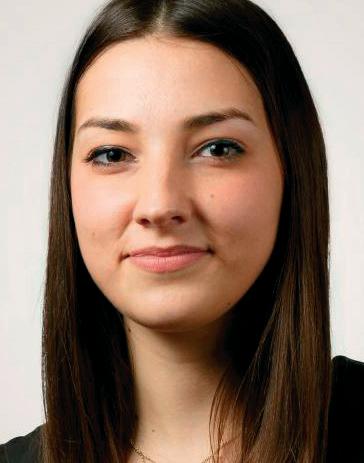
Soraja Zagić graduated in Political Science and International Relations and holds a master’s degree in Human Rights and Democracy. Over the past ten years, she has worked in the field of dealing with the past, with a particular focus on art and the exploration of marginalized narratives. She currently works as a project manager at the Pro Peace office in Sarajevo, where she leads projects in collaboration with various regional festivals and initiatives that focus on artistic representation and analysis of neglected stories and perspectives.

Experienced Community Manager and Project Leader with over a decade in international programs, event management and organizational development. Currently managing the WeBalkans regional communication program, leading YEA network initiatives, project coordination and high-level stakeholder engagement across the Western Balkans. Skilled in large-scale event management, having organized five World Ice Hockey Championships for the Serbian National Federation and numerous international conferences. Proven track record in strategic leadership roles, including National President and Europe Regional Coordinator for AIESEC. Passionate about building networks, fostering collaboration, and delivering impactful projects through data-driven decision-making and strong teamwork culture.

PR and Social Media Coordinator of the Young European Ambassadors Network. With nearly a decade of experience in communications and international relations, she has built a strong track record of connecting people, ideas, and initiatives across borders. Born and raised in Novi Travnik, Dzulisa has been an active voice in her community for over a decade, championing youth engagement, cross-cultural dialogue, and European values. Her work blends strategic communication expertise with a passion for fostering collaboration and creating meaningful opportunities for young people in the Western Balkans and beyond.

Lejla is a Human Rights Officer with the Office of the United Nations High Commissioner for Human Rights in Bosnia and Herzegovina. A PhD candidate in law, she brings over 18 years of experience as a legal expert and researcher in the fields of transitional justice and human rights. She has authored numerous scholarly articles, analytical reports, and research papers in these areas. Lejla collaborate with Sarajevo Film Festival on design and leading youth programs Dealing with the Past and Human Rights from its founding.

is a trained Balkan Diskurs correspondent from Bijeljina. Slobodan works as a project manager at the Youth Resource Center Tuzla, where he initiated the digital youth story CAT Bosnia and Herzegovina, which deals with the creation of alternative narratives in opposition to the existing radical ones.
Venue
Europe House is a long-term communications project of the Delegation of the European Union in Bosnia and Herzegovina, superseding the EU Info Centre in BiH, with its central office in Sarajevo (Europe House) and a network of Europe House Info Points across Bosnia and Herzegovina. As a project, Europe House provides relevant information on programmes, projects, institutions and policies of the European Union, as well as on relations between Bosnia and Herzegovina and the European Union. Europe House network activities include organisation of informative and inspiring events across BiH, with the aim of promoting European values in BiH.
DINO ABAZOVIĆ
Dino Abazović is a sociologist and academic based in Sarajevo, Bosnia and Herzegovina. He is known for his research on religion, nationalism, and identity in the Balkans, particularly in the context of the post-Yugoslav space. Abazović is a professor at the University of Sarajevo and has published extensively on topics related to the sociology of religion, interfaith dialogue, and the role of religion in public life. His work often explores the complex relationships between religion, politics, and society in Bosnia and Herzegovina, offering insights into the ways in which religious identities shape social and political dynamics in the region.
SIMA MOHAMMED AWAD
Sima Mohammed Awad is a Palestinian peace activist and English student from Beit Ummar, north of Hebron. Born in 2005, Sima lost her brother Mahmoud at a young age during a period of intense violence in the West Bank. Motivated by her family’s experience and her brother’s love and support, she has dedicated herself to promoting dialogue and reconciliation as a way to prevent further suffering and loss. Sima works to foster understanding and peace within her community, striving to create a different reality for future generations.
AYELET BARGUR
Ayelet Bargur is an Israeli film director, educator, and peace activist, working in both feature and documentary film. Her work often reflects her personal perspective on life in Israel and has received numerous awards, including nominations for the Israel Academy Awards, Best Picture at the Montpelier Film Festival, and the Grand Prix for Best Documentary at the European Prix Circom Awards. Her graduation film, A Good Place to Be, was selected for the Short Film Competition at the Cannes Film Festival. Bargur has also been awarded the prestigious Artist in Residence Grant in Berlin and was a guest at the Berlin 7th International Summer Academy. Based in Tel Aviv, she teaches film and participates in the Parents Circle Families Forum, promoting dialogue and peace in Israel.
CHRISTINA BARTSON
Christina Bartson is a filmmaker and archivist based in London with roots in the Midwestern United States. She holds an MA from New York University, where her graduate research focused on critical media theory, ethnographic cinema, and war media.
Igor Bezinović graduated from studies in film directing at the Academy of Dramatic Art in Zagreb, and in philosophy, sociology, and comparative literature at the Faculty of Humanities and Social Sciences in Zagreb. His films include THE BLOCKADE, VERUDA, which won the Oktavijan prize for Best Croatian Documentary, A BRIEF EXCURSION, which won the Big Golden Arena for Best Croatian Feature, and FIUME O MORTE!, which had its premiere at the International Film Festival Rotterdam, where it won the Tiger Award and the FIPRESCI Prize.
BENJAMIN ČENGIĆ
Benjamin Čengić is a street artist, film producer, and cultural activist based in Sarajevo. He is the founder of the NGO Obojena Klapa, the director of the Manifesto Gallery of Contemporary Arts, and the creative force behind the FASADA street art festival. Benjamin’s artistic journey began with graffiti in the post-war ruins of Sarajevo, evolving into a distinctive style featuring stylized one-line flowers. His work addresses themes of love, nature, ecology, and the passage of time. Through his initiatives, he has transformed urban spaces into open-air galleries, fostering a vibrant street art scene in Bosnia and Herzegovina.
Danijela Dugandžić is a feminist, curator, and cultural producer from Sarajevo. She is the director of the Association for Culture and Art CRVENA and a member of the feminist curatorial collective Red Mined. Danijela has been active in the feminist movement and feminist art for over 20 years, producing projects such as The Vagina Monologues across Sarajevo, Belgrade, and Zagreb, and participating in global V-Day events. Her work bridges art, academia, and social activism, including urban projects like Zajednički grad and the transnational laboratory Actopolis Sarajevo, all guided by feminist values and solidarity.
Zenit Đozić is a Bosnian actor, humorist, television producer, and former rock drummer. He gained prominence as a founding member of the iconic sketch comedy show Top lista nadrealista, which satirized Yugoslav society and politics during the 1980s. Known by his nicknames Zena and Fu-Do, Đozić also played drums for the pioneering rock band Zabranjeno pušenje. After the war, he completed his education at the Academy of Performing Arts in Sarajevo and earned a master’s degree in television production in London. Since 2006, he has been active as a television producer and continues to contribute to the cultural scene in Sarajevo.
Hasan Hasanović is a Genocid educator, author, and oral historian, and a survivor of the Srebrenica genocide. For over 17 eyears, he has educated hundreds of thousands of visitors at the Srebrenica Memorial, sharing his personal story and raising awareness about the genocide. Hasan is the author of Surviving Srebrenica (translated into Italian, Dutch, and German) and co-author of Voices From Srebrenica: Survivor Narratives of the Bosnian Genocide. He leads the Oral History Programme at the Srebrenica Memorial Center, which has collected over 700 survivor interviews, and has contributed to several museum exhibitions and the development of Oral History Guidelines in collaboration with Professor Ann Pertila (University of Denver).
Ajna Jusić is a human rights activist and psychologist from Zenica. In 2018, she founded the Forgotten Children of War Association, the first organization in the Western Balkans dedicated to advocating for the rights and recognition of children born as a result of wartime sexual violence. Ajna’s efforts culminated in the passage of a landmark law in Bosnia and Herzegovina in 2023, granting legal rights and protections to these children. In 2024, she was honored with the International Women of Courage Award by the U.S. Department of State for her unwavering commitment to justice and advocacy.
Yannis Karpouzis is an Athens-based filmmaker and visual artist. His artworks have been presented at major Greek and international institutions, including Artgenève, the Association of Icelandic Artists, the Deste Foundation, Rencontres d’Arles, and PHotoEspana. In 2021, his feature-length documentary NIKOS KAROUZOS: POEMS ON THE TAPE RECORDER won the Newcomer Filmmaker Award at the Thessaloniki Documentary Festival, among other accodlades.
MLADEN MILJANOVIĆ
Mladen Miljanović completed his bachelor’s and master’s degrees at the Academy of Arts in Banja Luka and defended his PhD thesis in New Media at the University of Arts Belgrade. He teaches intermedia art at the Academy of Arts, University of Banja Luka. His work has been selected for exhibition at institutions and festivals including the Venice Biennale, the Busan Video Biennale, and the Cairo Biennale. Solo shows and projects have been mounted at galleries including MUMOK in Vienna, Gallery MC in New York, the ACB Gallery in Budapest, the Antje Wachs Gallery in Berlin, the Neue Galerie Graz, and many others.
NICHOLAS MOLL
Nicholas Moll is a historian, researcher, and facilitator, known for his work on memory and reconciliation in the Balkans. Based in Sarajevo, Moll has been actively involved in projects that address the legacy of conflict in the region, focusing on how societies remember and deal with the past. He collaborates with various organizations, including NGOs and academic institutions, to promote dialogue and understanding between different communities. Moll’s research often explores the intersections of history, memory, and identity, particularly in the context of post-conflict societies. His contributions have been significant in fostering cross-cultural dialogue and supporting peacebuilding efforts in Bosnia and Herzegovina.
SEMIR MUJKIĆ
Semir Mujkić is a investigative journalist and editor from Bosnia and Herzegovina. He is the managing editor at BIRN Bosnia and Herzegovina, leading the multimedia newsroom of Detektor.ba, which won the 2020 European Press Prize Special Award for its reporting on transitional justice issues. Mujkić has been recognized with multiple accolades, including the EU Investigative Journalism Award (2019), the Best Multimedia Investigation into Corruption by ACCOUNT (2018), and a UNICEF prize for journalistic contributions to child rights (2016). He holds a degree in journalism from the Faculty of Political Sciences in Sarajevo and has been a journalist since 2006.
IVAN JANI NOVAK
Ivan Jani Novak is a musician, composer, producer, and cultural thinker from Slovenia. Born in 1952 in Trbovlje, Novak is a founding member and key figure of the iconic band Laibach, shaping its unique aesthetic and ideological approach. The band is renowned for its provocative performances, politically charged reinterpretations of national anthems, and controversial cultural interventions, particularly in the former Yugoslavia. Novak was also a central member of the avant-garde art collective Neue Slowenische Kunst (NSK), which established the conceptual NSK State in 1992. Through Laibach, he explores the intersections of ideology, culture, and art, often using irony and parody to comment on political and social phenomena.
MAI PERRY
Mai Perry is a peace advocate from Kiryat Ono, near Tel Aviv. In October 2023, Mai tragically lost his uncle, Daniel, during the attack on Nir Oz, and his grandfather, Haim, was taken hostage to Gaza by Hamas militants, later killed in February 2024. Haim was a dedicated peace and anti-occupation activist, known for volunteering to transport sick children from Gaza to Israeli hospitals. Inspired by his legacy, Mai continues to honor his family’s commitment to dialogue, compassion, and the pursuit of a more peaceful future.
ALEKSANDAR RELJIĆ
Aleksandar Reljić is a journalist and documentary film director. His work focuses on human rights, war crimes, xenophobia, and inter-ethnic relations in the Balkans. He has received numerous professional awards.
Damir Šagolj is a Bosnian photographer and journalist. He completed power engineering studies in Moscow and Sarajevo but the Bosnian war and its total destruction meant a change in career for Damir. In 1996 he joined Reuters news agency as theirs Bosnia based photojournalist. For next 22 years Damir travelled the world and reported on major news stories for the agency – mostly on conflicts, civil and other disturbances and natural catastrophes, but also on contemporary and other issues. He lived in Russia, Thailand, China and spent years in the Middle East. Damir’s work was recognised with industry’s major awards – the Pulitzer prize and World Press Photo among many others. He holds a master degree from the University of Arts in London. Currently, Damir lives in Sarajevo and teaches photography at the Sarajevo Academy of Performing Arts.
Morten Traavik is a Norwegian director, artist, and writer born in 1971. He trained as a theatre director at GITIS in Moscow and the Dramatiska Institutet in Stockholm. Traavik is known for his provocative and boundary-pushing art projects, including Miss Landmine (2008) and Pimp My Aid Worker (2010), which have sparked international debate and discussion. His notable works also include the documentary Liberation Day (2016), which follows the Slovenian band Laibach as they become the first Western band to perform in North Korea. Traavik has collaborated with North Korean artists and cultural authorities, aiming to bridge cultural divides through art. In 2010, he was the Norwegian Armed Forces’ first and only artist-in-residence. His latest documentary North South Man Woman, codirected with Sun Kim, is a part of the “Dealing with the Past” program, highlighting its relevance to post-conflict reconciliation and cultural dialogue.
MAGDALENA ZELASKO
Magdalena Zelasko, born in Kraków, has lived in Vienna for around 30 years. A certified marketing and advertising expert, she studied journalism, communication science, and Slavic studies at the University of Vienna, where she completed her doctorate in 2005. Before founding the Let’s Cee association and managing the successful festival of the same name from 2012 to 2018, she worked as a lecturer in the Department of Culture and Communication at the University of Vienna. Since 2022, Żelasko has been implementing the innovative EU-funded film education project EU Youth Cinema: Green Deal, which is now offered in twelve countries.

United States, 2025, Colour and B&W, 13 min, English
Director: Christina Bartson
Adapted from a 1968 essay by the gay US socialist David E. McReynolds, the short archival film uses images and sounds of the American war in Vietnam to reflect on the feedback loop between militarism abroad and at home — and the people who resisted it.

Austria, 2024, Colour, 100 min, Polish, German Director: Magdalena Żelasko
Screenplay: Magdalena Żelasko, Michał Kozioł
In September 1943, seventeen-year-old Stanisław Zalewski was arrested in Warsaw as a member of a Polish resistance group and taken to the Auschwitz-Birkenau extermination camp for labour service. From there, he was sent to Mauthausen and finally to the Gusen camp, where prisoners were forced to work for the German armaments industry under inhumane conditions. For a long time, Zalewski, like many other victims of Nazi terror, remained silent about his painful experiences. Now, for the first time, he tells his stirring life story in a film as a deeply impressive “ambassador of remembrance.”
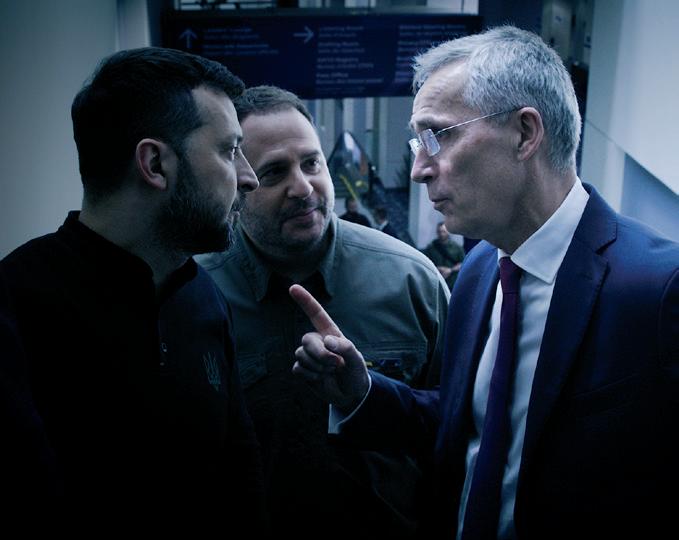
Norway, Iceland, Denmark, Finland, Sweden, Belgium, 2025, Colour, 104 min, English, Norwegian
Director: Tommy Gullliksen
Screenplay: Anne Marte Blindheim, Tommy Gullliksen
As Putin’s war in Ukraine rages on, US president Biden persuades Jens Stoltenberg to remain for one more year as Secretary General of NATO. The Norwegian’s post has already been extended several times, and he has promised his wife he will come home this time. But the situation in Ukraine is precarious. NATO is facing its biggest challenge since WW2: Stoltenberg commits to one final year. On a trip to Kyiv, he promises Ukraine’s president Volodymyr Zelenskyy that the alliance will stand by Ukraine “for as long as it takes.” At this crucial time, support from the allied countries falters, leaving the prospect of peace in Ukraine and stability in Europe in question. Will Stoltenberg be able to keep his word to Zelenskyy?
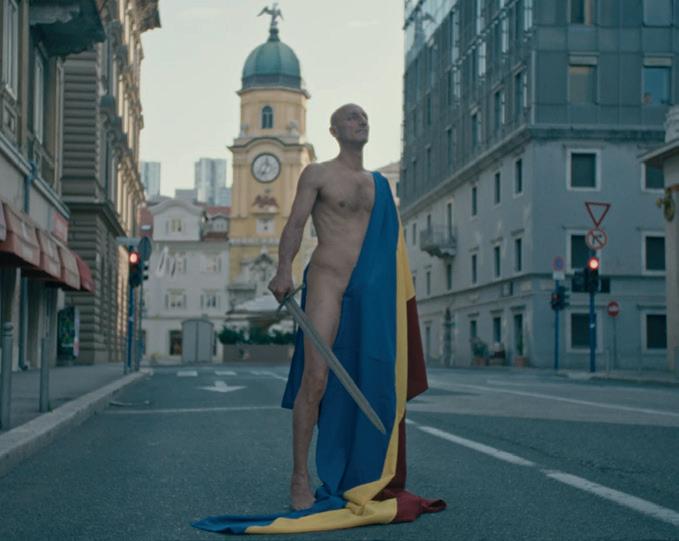
Croatia, Slovenia, Italy, 2025, Colour, 112 min, Croatian, Italian
Director: Igor Bezinović
Screenplay: Igor Bezinović
Citizens of Rijeka, Croatia, which Italians call Fiume, retell, reconstruct and reinterpret the bizarre story about the sixteen-month occupation of their city in 1919 by the Italian poet, dandy, and preacher of war Gabriele D’Annunzio.
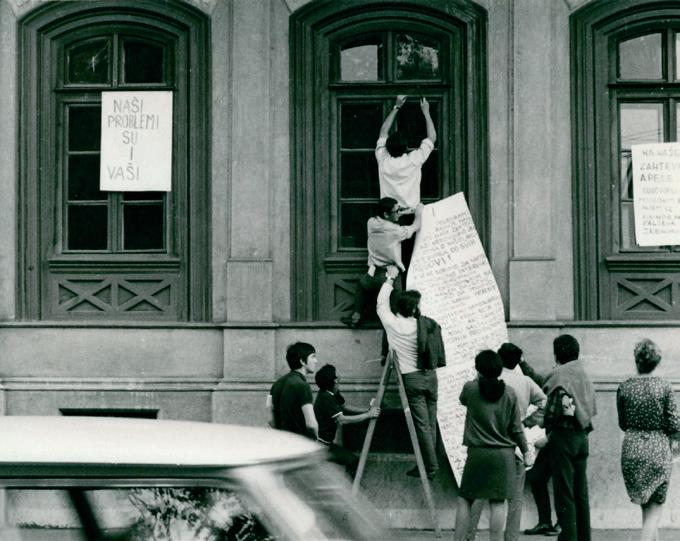
Yugoslavia, 1969, Black and white, 10 min, Serbo-Croatian
Director: Želimir Žilnik
Screenplay: Želimir Žilnik
JUNE TURMOIL documents student demonstrations that took place in Belgrade in June 1968. For the most part, the footage was shot in the courtyard of Kapetan Mišino Zdanje (the Faculty of Philosophy building), where students gathered and famous artists participated to show solidarity with the students.

Greece, 2025, Colour, 13 min, Greek
Director: Yannis Karpouzis
Screenplay: Yannis Karpouzis
Nefeli turns the camera on herself to say goodbye to a lost love. What begins as a personal farewell becomes a growing connection to collective resistance.

Norway, Latvia, Republic of Korea (South Korea), 2025, Colour, 93 min, Korean
Director: Morten Traavik, Sun Kim
Screenplay: Morten Traavik, Sun Kim
An old Korean proverb says the most beautiful women are in the North, and the most handsome men are in the South. What happens when you try to bring them together? Filmmakers Morten Traavik and Sun Kim journey across the Korean divide to follow Yujin Han, a sharp, charismatic entrepreneur who was born in North Korea and is the founder of LoveStorya, a matchmaking agency with a radical mission: pairing North Korean refugee women with South Korean men.

France, Palestine, Iran, 2025, Colour, 112 min, English
Director: Sepideh Farsi
PUT YOUR SOUL ON YOUR HAND AND WALK is a filmmaker’s response to the ongoing massacre of Palestinians. A miracle happened when director Sepideh Farsi met Fatima Hassona. Hassona became the filmmaker’s eyes in Gaza, where she resisted while documenting the war, as Farsi became a link between Hassona and the world at large from what she calls her “Gaza prison.” The two maintained this lifeline for almost a year. The bits of sound and pixel they exchanged became this film. The death of Fatima, on 16 April 2025, as a result of an Israeli raid on her home, changes its meaning forever.

Israel, Palestine, 2025, Colour, 15 min, Hebrew, Arabic
Director: Ayelet Bargur
TESTIMONIES OF PAIN AND HOPE is a powerful series of six short illustrated videos, each two or three minutes long, that share the deeply personal stories of bereaved Israelis and Palestinians who are members of the Parent Circle Families Forum who have lost loved ones in the war that began on 7 October 2023. Through intimate, first-person testimonies accompanied by expressive hand-drawn visuals, each piece gives voice to a member who has chosen to transform their pain into a call for peace and reconcilaition.

Germany, 2024, Colour, 93 min, German
Director: Christoph Baumann
Screenplay: Christiane Heckes
Tyrol, 1945: the last days of World War II. Anton, a severely wounded deserter from the SS, and Hannah, a Jewish woman, meet in a remote hut in the mountains. They are initially distrustful of each other, then feelings develop between them. But, danger is ever present. For these two, the war is far from over. A story about war and guilt, as well as compassion and humanity.
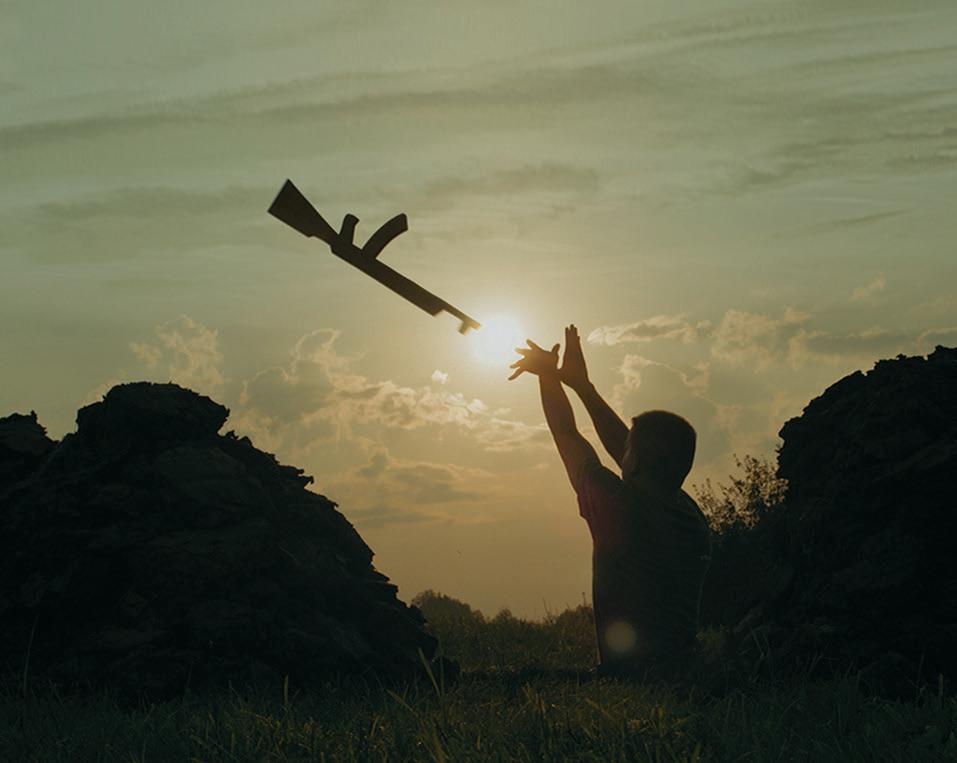
Germany, Bosnia and Herzegovina, 2024, Colour, 66 min, Bosnian
Director: Mladen Miljanović
Four delegated performances and castings feature participants who are directly or indirectly actors of war: veterans, civilian victims, disabled individuals, or those traumatised by conflict. The project, aptly titled THE FINAL BATTLE, unfolds both in actuality and in its eventual cinematic manifestation through a casting call for a trailer. Reminiscent of clichéd Hollywood tropes, the call heralds the production of what is touted to be a high-grossing blockbuster centred around THE FINAL BATTLE. The trailer enumerates historical clashes like the Battles of Cannae and Waterloo and more recent conflicts such as the Battle of Stalingrad alongside smaller sites of violence in Bosnia and Herzegovina: Bihać, Trebinje, Bijeljina, and Doboj, where casting for this imagined film takes place.

Serbia, Bosnia and Herzegovina, 2025, Colour, 28 min, Serbian
Director: Aleksandar Reljić
Screenplay: Aleksandar Reljić
Students in Serbia did not celebrate the New Year of 2025; instead, at midnight, they held a fifteen-minute tribute to the victims of the canopy collapse at the Novi Sad Railway Station on November 1, 2024.

Germany, Austria, 2025, Colour, 88 min, Bosnian, Serbian, English
Director: Chiara Sambuchi
Screenplay: Chiara Sambuchi
In July 1995, the Army of the Republika Srpska captured Srebrenica and massacred more then 8,000 Muslim men. The Bosnian Serb Army troops destroyed every trace of Srebrenica’s inhabitants: their diaries, photos, and letters. One VHS tape survived destruction. This unique document is a four-hour film that describes in emotional detail everyday life in the enclave shot for a single viewer: Alisa, the then nine-year-old daughter of Sejfo, an avid amateur filmmaker and resident of Srebrenica. Alisa returns to Srebrenica to trace the footsteps of her father.
Selector - Dealing with the Past: Nebojša Jovanović
Project Coordinator: Amar Komić
Programme Designer - In Youth Eyes: Lejla Gačanica
Facilitator - In Youth Eyes: Slobodan Blagovčanin